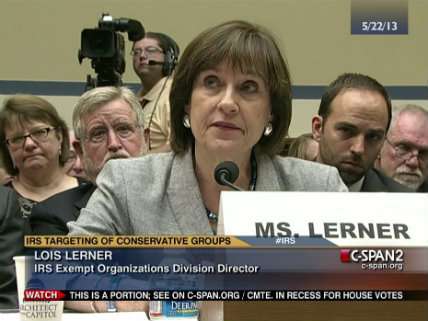The IRS Says It Lost a Bunch of Lois Lerner's Emails. That Deserves More Scrutiny

On the surface, it doesn't seem very plausible that the Internal Revenue Service (IRS) managed to lose emails to and from Lois Lerner, who is at the center of the House Ways and Means Committee's investigation into IRS targeting of conservative groups for extra scrutiny.
But that's the explanation the IRS is going with: Despite the fact that the investigation has been going on for a year, and despite Lerner's prominence in the story, the IRS, which has previously promised to comply with the committee's documents request, claimed last week that it cannot produce an untold emails between Lerner and outside agencies like the White House that were sent before 2011, arguably the most important time period to the investigation, because of a computer crash.
The loss of a personal computer hard drive shouldn't be able to permanently eliminate emails from a well-run workplace email system. Those emails are run through central email exchange servers, and backups are typically kept using those central exchanges. Add to that Lerner's prominence in the investigation—she has repeatedly declined to answer questions before Congress, invoking her Fifth Amendment right not to self-incriminate—and the year it took for the IRS to inform the House Ways and Means Committee that the emails were lost in a crash, and the dog-ate-my-emails bit starts to smell rather fishy.
But accidents do happen, and I've had tech-savvy, right-of-center federal agency staff tell me that federal IT management is so shoddy and haphazard that it's at least possible that the excuse is completely legit. Email systems break, or have odd glitches that result in personal email backups being stored on individual hard drives, even when they shouldn't. In that situation, it's conceivable that if there's a crash, that's it—the emails and other information really could be gone.
And let's not forget that if there's one thing that we've learned in the last few years, it's that the federal government is not particularly good at IT management.
So although the excuse seems more than a little bit dubious, I'm willing to give the IRS the benefit of the doubt—but only tentatively. It's possible that the emails really were lost in the world's most convenient computer glitch, but possible is not the same as certain.
If a tax filer made a similarly convenient excuse to the IRS regarding lost documentation, the agency would probably want to dig in a bit. That's why I think this is the sort of thing that deserves additional questioning, and a more thorough investigation. It's only fair.
Where to begin? Investigative reporter Sharyl Attkisson has put together a useful list of the sort of questions that ought to be asked. Here's a sample:
- Please provide a timeline of the crash and documentation covering when it was first discovered and by whom; when, how and by whom it was learned that materials were lost; the official documentation reporting the crash and federal data loss; documentation reflecting all attempts to recover the materials; and the remediation records documenting the fix. This material should include the names of all officials and technicians involved, as well as all internal communications about the matter.
- Please provide all documents and emails that refer to the crash from the time that it happened through the IRS' disclosure to Congress Friday that it had occurred.
- Please provide the documents that show the computer crash and lost data were appropriately reported to the required entities including any contractor servicing the IRS. If the incident was not reported, please explain why….
- Please explain why redundancies required for federal systems were either not used or were not effective in restoring the lost materials, and provide documentation showing how this shortfall has been remediated.
- Please provide any documents reflecting an investigation into how the crash resulted in the irretrievable loss of federal data and what factors were found to be responsible for the existence of this situation.
The computer-crash excuse from the IRS seems potentially outrageous, but it also seems like the sort of excuse that the IRS would want to avoid if they were hoping to avoid additional scrutiny; after all this sort of convenient tech trouble was bound to raise additional questions. It's not possible to say what happened to those emails, at least not yet, but now that those questions have been raised, they should be answered.


Show Comments (135)